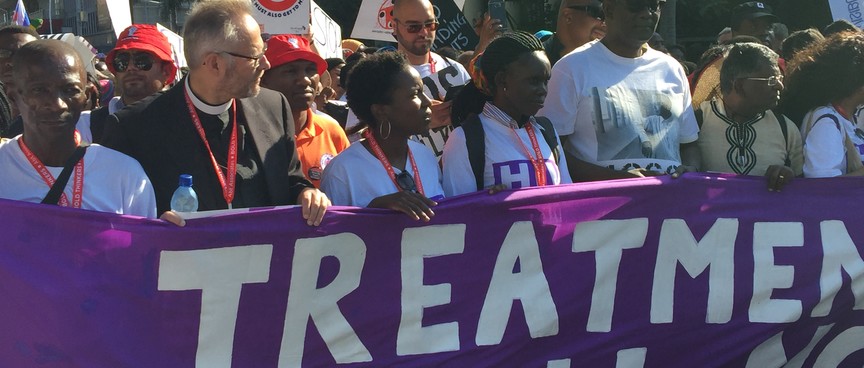Financing of the global response to HIV
Commitment by the German Government does not live up to expectations

Despite a budgetary surplus of 18.5 billion euros, Germany’s contribution for the continued funding of the Global Fund to Fight AIDS, Tuberculosis and Malaria (GFATM) was only moderately increased. German civil society is appalled by Germany’s limited commitment to end AIDS by 2030
Berlin/Munich, 15.09.2016: Setting an end to the epidemics of AIDS, TB and Malaria only merits another 25 million euros more as Germany’s annual core contribution. This is the sad conclusion that has to be drawn from today’s announcement by the Head of the Federal Ministry for Economic Cooperation (BMZ).
On the occasion of the ‘Future Conference’ held in Munich, Minister Müller announced an increase for the replenishment period 2017 to 2019 from presently 600 million euros to 800 million euros for the GFATM: “This is an important contribution for the GFATM. However, a closer look shows that the increase by 200 million euros is only a one-off affair and cannot be regarded as a significant rise in Germany’s long-term contribution. Based on preliminary information, debt-to-health swaps as well as Germany’s technical support for the Global Fund were for the first time calculated into Germany’s contribution. The actual increase of the core contribution therefore only amounts to a meagre 25 million euros annually“, says Astrid Berner-Rodoreda, Spokesperson for Action against AIDS Germany.
In view of full budgets and the proven success of the Global Fund, this is certainly a serious disappointment. The insufficient commitment by the German Government will mean that the Global Fund will not be able to save human lives to the scale it had foreseen. Our attention now focuses on Chancellor Merkel. We expect her to show more support for the most important global issues. The Replenishment Conference for the Global Fund in Montreal, which will begin on 16 September, would provide the adequate framework” says Joachim Rüppel, Spokesperson for Action against AIDS Germany.
“In light of Germany’s economic importance as the fourth-largest national economy worldwide and with a current budget surplus of more than 18 billion euros, the German Government would be in a position to pledge the fair amount of 1.2 billion euros for the period 2017 to 2019. Internationally, Germany likes to be regarded as a responsible donor and important contributor to global health policies. This description unfortunately does not correspond entirely with reality,” adds Sylvia Urban, Spokesperson for Action against AIDS Germany.
Since the signing of the Agenda 2030, this would have been Germany’s first chance to prove its commitment and it has missed this initial chance to turn words into deeds and to finally make an adequate contribution towards global health. During the UN High Level Meeting in New York in June 2016, Germany also adopted the Political Declaration on HIV which is a self-commitment by all member states to increase efforts for an end to AIDS. However, ending the AIDS epidemic by 2030 will only be possible, if Germany makes an adequate contribution, if it increases its efforts and gives up its “business as usual” attitude.
“On behalf of millions of people living with HIV, tuberculosis and malaria, we will continue to advocate for a fair German contribution to the Global Fund. Germany’s minimal increase is right-out embarrassing compared to the contributions by countries with less economic power. Germany’s contribution for global health and the response to HIV is still far from being fair“, emphasizes Astrid Berner-Rodoreda.
A summary of a report about Germany’s contribution to global health and the HIV response can be downloaded here (the full report will follow soon): http://www.aids-kampagne.de/sites/defaul...
